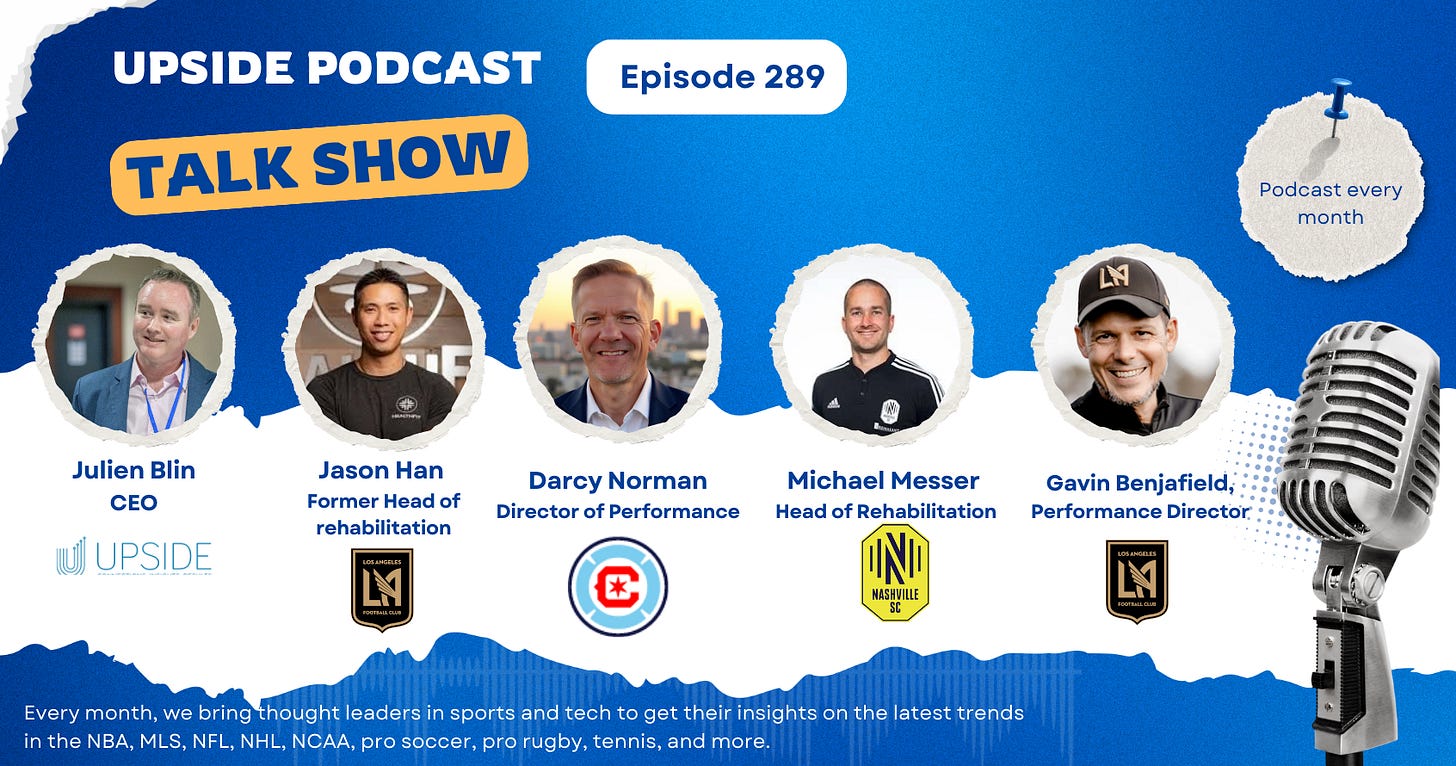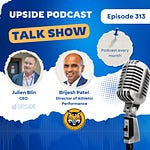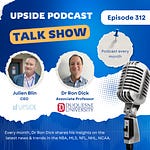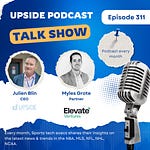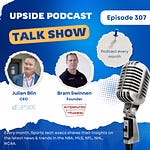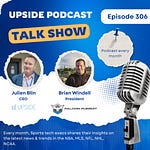This week we have the honor to interview again a group of sports performance executives to talk about the latest trends in the world of sports performance and rehabilitation.
Jason Han, Former Head of Rehabilitation, LAFC (MLS). Jason is also the head of business development in North America at OneBase health.
Michael Messer, Head of Rehabilitation, Nashville SC (MLS).
Darcy Norman, Director of Performance, Chicago Fire FC (MLS).
Gavin Benjafield, Performance Director, LAFC (MLS).
You can watch the video interview below or you can listen to the audio interview above:
📝Show Notes: Through this interview, we touched on:
MLS Playoffs – Adapting Recovery & Training.
MLS Offseason – Reflection & Reset
Grass vs Turf – Adapting Preparation
2026 World Cup – Managing the Midseason Pause
You can read the full transcript of the podcast interview located at the top of this blog post.
Here are some of the best quotes of our conversation with Darcy, Gavin, Michael and Jason:
Q1. MLS Playoffs – Adapting Recovery & Training
Gavin Benjafield (LAFC) - On the Challenge of the FIFA Window:
“Decision was the 18th of October, MLS Cup final is December 6th. So you’re looking at a seven-week duration of the playoffs. What makes it the most challenging is that there’s actually a FIFA window bridging almost the first half and the second half of the playoffs. We have seven players away on international duty. We completed the first round in two games, so there’s a good 21 days between our last game and the semifinals. That really is a challenge to keep players engaged, keep the rhythm going, keep the cycle going, keep the competitiveness going. We’ve taken 10 months to get to this point of building a team, building the cohesion, building the rhythm of competition. And now we’re basically completely out of rhythm.”
Gavin Benjafield - On Managing Split Training Groups:
“Right now, my biggest focus would be the players that have played the most number of games and minutes. We’re actually having them more in a maintenance and rest and recovery phase, and the players like the subs, maybe guys that haven’t had as many minutes or have come back from injury, we’re actually using this as a mini loading period. Then the last block before the game will almost put everyone on the same program—a tapering program and getting them ready. But I have no control of those seven players that are away, and it makes it incredibly challenging to go to Vancouver and play a semifinal with only having two days of training with your full starting 11.”
Jason Han (Former LAFC) - On Controlling the Controllables:
“Regardless of the schedule or these guys going away, they’re essentially distractions. Of any high performer, whether it’s the athlete or us as performance staff individuals, I think we pride ourselves on our ability to control the controllables—and that’s really ourselves. The attention to detail was a little bit better. Even within staff, because it is a long season, we can all complain that we don’t play for three more weeks and we have Vancouver away on turf. It is what it is. I think the faster that we as a staff can actually hone in on what we need to do, that bleeds over to the players. The year that we won, we had Vela, we had Chiellini, we had Bale—we had guys that had been there that don’t get rattled. That’s where it kind of all bleeds down, where you’re able to get through the mud in a sense.”
Jason Han - On Recovery Modalities:
“In 2022, that’s when we brought the hyperbaric chamber into the club. We have to be able to sell it to them in the sense where like, ‘Hey, we’re in a heavy period right now. You’ve been through X amount of injuries. We need to get the most out of you. I know you don’t want to get in the chamber every day. I know you don’t want to do these things, but for the betterment of the team and yourself, this is what we need to do. Are we good? Let’s lock in. Let’s lock shoulder to shoulder.’ That was LAFC’s mantra—how can we lock shoulder to shoulder as a staff, as a team, as a brotherhood in a sense, to get the job done. That’s when we won in 2022.”
Darcy Norman (Nashville SC) - On the Nature of the Playoffs:
“It’s a bit of a double-edged sword. There’s not that many games in the MLS. When I was at Bayern and Roma, we were playing in all three trophies all year round—you’re at 60 games, all your players are off playing international teams. So it was a rinse and repeat all year long. So there’s that side of it, and then there’s these gaps and windows that you just gotta accommodate for. It kind of is what it is. It’s really the Shackleton experiment of managing expectations, telling them what’s gonna happen, why it’s gonna happen, how it’s gonna happen, so when it happens, nobody’s surprised. It reminds me that MLS is still a developing league.”
Mike Messer (Nashville SC) - On the Unpredictability:
“The MLS playoffs are just a bit of a roulette. You just don’t know what you’re gonna get. There’s so many uncontrollables, and so what it really does come down to is what can you control. We spend the whole season trying to get these guys in a rhythm, and even little things like having to change the training cadence because now we’re playing games on Friday, Saturday, Sunday, Monday nights, which we don’t normally do in the regular season. There’s just a lot of things that you get thrown a curve ball and you just kinda have to manage it as best you can.”
Mike Messer - On Medical Approach:
“You start to look at some of the guys who have been out—maybe in the season you take a little more conservative approach. Maybe you start to look at that a little bit differently. With the season winding down, maybe you start to push a little bit, take a little more risk. Obviously if the player’s willing and staff are willing as well. It just puts a little bit of a different tint on some of the rehabs you have and your approach to them.”
Q2. MLS Offseason – Reflection & Reset
Darcy Norman - On Continuous Work:
“It feels like another, a different season of different work. For us, we’re giving the guys just like, ‘Hey, walk away.’ It’s always tough when you’re pushing for something and then you don’t make it. So just to have everyone clear their head. Then we’re running optional mini camps starting December 1st all the way up until when guys report back on the 10th. We’ll have a little break at Christmas, but just trying to provide them the opportunities to come in and train and stay fresh because it is a long season. I think it’s gotten shorter over the years, which is in a good way, because it’s hard to go in such a span without playing and ramping up fast and hitting games. So just at least keeping guys ticking over, working on stuff that they need to work on to get better and improve as players.”
Darcy Norman - On Building Systems:
“It’s a constant audit. We’re going through all the reviews, summarizing the season—what worked, what didn’t. This staff here at Chicago is kind of year one for us all as a group. There was a lot of systems and structures and things that we needed to get organized. We were kind of building the boat as it was moving from day one because it was all these quick hires and getting going and then you’re off to preseason. Our theme this year was process, transparency, and legacy. So it was writing down everything you did. Our things are like a digital wiki—everything is hyperlinked and connected so that anybody can find anything at any one time. If something were to happen to anybody, I can click a button and understand exactly all the bits that they’re touching that I might not appreciate in their day-to-day. Now we’re putting all the pieces together, getting a V1 on all that stuff, and then putting plans in place to figure out how we’re gonna do it better next year.”
Gavin Benjafield - On Staff Reviews and Innovation:
“I use the November FIFA window to complete my staff reviews for the year. We do that little bit of a mini audit. We’ve had good turnover retention of staff for the last four years under the same coach. So my challenge is almost more around, ‘Are we doing things that we should continue doing in 2026 or should we actually stop doing certain things and innovate in a different direction?’ Also, with the challenge of a new coach coming in 2026, you almost can’t be making plans when you don’t know who the coach is gonna be. So I’ve switched our focus a little bit more. My focus for 26 is actually gonna be more the integration of the different departments and the different tiers within the club—how can we integrate better with the second team, with the academy? I start with a blank canvas. Whatever we did last year worked for last year, but for 26 it’s not gonna work. So I need to break it all down to build it all back up again to figure out what combination is gonna be the right combination with the players that remain, the new staff that do or don’t come, and obviously we’ll have a brand new technical staff.”
Mike Messer - On Recharging:
“No offseason has been the same in five years. I’ve had some seasons where I have one guy that hangs around with a long-term rehab. I’ve had some seasons where I’ve had five or more hang around for a long-term rehab, so it doesn’t really feel like the offseason at that point. But I do think one of the really important things is to appreciate what it is, which is the offseason. You have to find some way, shape, or form to recharge and get ready for the next season because it is hard. We’re always thinking—it’s hard to turn that off. But you really do have to try to find a way to recharge your batteries a little bit, collect yourself. I think that comes down to the individual. For me, I try to take a few days to go back home, see our immediate families. Then the days tend to be a little bit shorter in the offseason, so you try to take advantage of that extra time that you have on a day-to-day basis and just make sure that you’re ready for what the next season is gonna bring.”
Mike Messer - On Player Expectations:
“The big thing is establishing expectations before they leave. Making sure that they understand that when they come back day one of preseason, this is where we expect you to be. We’re gonna try to communicate between now and then as best we can and facilitate that as best we can. But ultimately, if you’re choosing to not be at the facility and go somewhere else around the world, this is the standard that we’re gonna hold you to when you come back. So clear expectations.”
Gavin Benjafield - On Player Check-ins:
“We go radio silence for two weeks. We’re not gonna make any contact with any players for two weeks—you’re not gonna get a text, a phone call, anything from us. After that two-week period, depending if it’s a starter, maybe it’s a three-week period because their offseason plan looks different to a sub’s offseason plan. But typically a sub from the two-week mark onwards is gonna start getting check-ins. We break up the squad relationally—who do I have the best connection with and who can I hold accountable over the offseason? I check in, sometimes twice a week, sometimes only once a week. How’s the plan going, where you’re at, how’s the family—a little bit of a life-work balance combination. There are some guys that don’t need check-ins and they come back flying on day one, and there are other guys that I just hope that we don’t have a nine-week offseason because the guy’s in such a deep hole. Having good relationship with your players is vitally important, but giving them that time where they’re totally disconnected is just as important because they’ve invested so much time physically and mentally into the season.”
Jason Han - On Segmentation and Documentation:
“Gavin’s always been really good at segmenting. We talk as a group all the time—’Jason, who are you in charge of? Gav, who are you in charge of?’ So we would segment it that way. You actually have two different populations—your healthy guys (the starters, the subs, based on minutes) and then you have your rehabs, your long-term rehabs. It depends where they are in their rehab cycle. There are other players that don’t get back to you, and you document how many times you reached out to them because Gav or Steve’s gonna ask, ‘What’s going on with so-and-so?’ Like, ‘Look, I’ve texted him this many times, I’ve called him this many times.’ Because maybe, or maybe not, there’s times where the player goes, ‘No one reached out to me.’ Look at my WhatsApp. So that communication—as long as you can do that in the offseason as well as you can, then you can come back before preseason where we are game planning and we predict this person that we haven’t heard from, how’s he really gonna come back? So we’re already planning two or three steps ahead.”
Darcy Norman - On Player Commitment:
“Wrapping up the season, it was like, ‘Okay, obviously we have work to do, we failed out of the playoffs, so who wants to get better?’ You’re looking for a team of guys that are putting up their hand to say, ‘Yes, we want to get better. We all have goals, we all want to get there.’ So they make a verbal commitment to what’s happening. It makes the conversations easier, it makes the programming easier, and staying in touch with the guys so that when they come back you can hit the ground running. Hence our optional mini camps—we’re doing everything possible so that when we start the next season, there’s no excuses as to why we’re not hitting the ground running.”
Q3. Grass vs Turf – Adapting Preparation
Gavin Benjafield - On Recovery Timing:
“It’s always very contextual. Let’s paint a picture—you play on turf on a Saturday and you’re in a density period, so you’re now playing Wednesday and Saturday. Grass field players that train on grass, play on grass, go and play on turf, and especially when there’s an age factor added to that, they just take that extra 12 to 24 hours to come back from joint pain, this tendon pain, that hurts. Contextually, if we have a midweek game, then we’re throwing the kitchen sink at the recovery. We may adjust what our match minus one looks like because we still know that some of these older players are still in a recovery phase from that.”
Jason Han - On Proactive Treatment:
“Knowing that you’re gonna be in Vancouver in a few weeks, the ground reaction forces are gonna be that much more. Whether it’s the post-practice recovery strategies, we’re really just pushing that a little bit more. There’s some guys that don’t like to do proactive steps, so it was really up to us to grab them like, ‘Hey, come in, come in.’ Now in this period where you’re gonna have seven starters that are out, you’re gonna grab players that weren’t even used to being on the table. You’re putting them on the table and they’re like, ‘What?’ I was like, ‘Look, we’re doing everything that we can with what we have at this point. If there’s a situation where you’re going in, you’re gonna feel your best. Don’t worry about the starters that are not here. We can’t do anything about them right now.’ At least leading up to the game. And then understanding that it does take another 12 to 24 hours for these guys to kind of turn around. We’re gonna do what we need to do on our part from the performance and medical staff, but also being able to relay that to the technical staff like, ‘Hey, this is what we’re gonna see.’ And then hopefully there’s that cohesion where we can actually start the training cycle in the way it should or a little bit lower than you would otherwise.”
Gavin Benjafield - On ACL Reintegration:
“It often comes into discussion with players that may be carrying an injury or carrying a past injury. If we had an ACL player and he was reintegrating back into team minutes, and now all of a sudden we were gonna play three away games and all of them were gonna be on turf, and it was not a critical part of the season, then we would be more conservative and we’d speak to our coaches and go like, ‘Yeah, you know what? This is not the ideal reintegration for this player and his minutes. Let’s be a little bit more conservative in terms of how many minutes we’re gonna allow him to be playing on turf.’ Because yes, there is definitely a different factor involved when he is playing at home on grass or away on grass and then also away on turf. So it is just taking all factors into consideration when you’re trying to make the best decision possible. That’s most of our jobs—we’re just trying to collect as much information as we can and make the best decision that we can with all the facts that we have, and then draw the player into that conversation and decision as well, and obviously the technical and head coach as well. Part of our job is to see things before they actually happen and to try and navigate through the muddy waters that sometimes aren’t very clear. You just hope that the decision that you’re making is more right than it is wrong.”
Mike Messer - On Different Coaching Philosophies:
“I’ve had a little bit of an interesting experience in Nashville between two different coaches. One coach took the perspective when it came to turf where he actually wanted us to train on the turf for at least two training sessions prior to the match, which led to a lot of complaints from some of those senior players. You kind of take the multiplier of the complaints that you get from guys having to play on turf in a match and then add two days of training on top of that. The medical staff is pulling their hair out trying to get these guys to turn around after those three days. The turf field we have now with the new coach kind of sits vacant. He has bought in a little more to the aftermath of what you deal with from the players when you do give them that extra time on the turf. I think there was the realization of maybe we actually get more out of them when we manage this a little bit more, rather than try to get them to see how the ball bounces on the turf two days leading up to the match so that when they get there it doesn’t feel foreign to them. I just think some of the problems that we were dealing with after the fact maybe outweighed the technical benefit from that extra time on the turf.”
Mike Messer - On Medical Management:
“Overall as a medical staff, you’re gonna expect it. The guys with the tendinopathies, maybe are a little more conservative with someone who’s coming back from an ACL injury. You make sure that everyone is aware of that and you just try to manage it as best you can. But at the end of the day, if it’s your star player, it’s probably gonna be more about the recovery on the back end rather than the management of minutes in the match.”
Darcy Norman - On Tailored Recovery:
“I think also just educating the players, right? What are they recovering from? Is it the turf or what the turf is causing? Is it more muscle soreness versus joint soreness versus just overall general neural fatigue for maybe a perceived harder surface? Then tailoring your recovery strategies to those various complaints. If somebody’s got more of a joint issue, you might change their programming to more isometrics, get them in the pool, front-loading, more cold-based scenarios to help with inflammation and irritation. Where if it’s more muscular soreness, it’s a whole different set of pieces where it might be more mobility and contrast and flow-based stuff and aerobic. Versus neural fatigue where it’s just more meditation and sleep and controlling some things. So I think there’s a variety of ways to handle it. That also puts the players in a little bit of the driving seat—you’re providing the tools and then they can kind of feel and do a little bit of a choose-your-own adventure that deals with what they’re dealing with as well as giving them some autonomy to what also feels good to them instead of saying, ‘Hey, everyone’s on this path.’”
Darcy Norman - On Mindset:
“A lot of it is just the mentality of how you approach it. It’ll only be a problem if it’s a problem. So don’t make it a problem. I don’t think the injury rates or research isn’t that conclusive. I think we just make this assumption that, ‘Oh, it’s turf, it hurts’ because ‘I don’t like playing on turf for whatever reason.’ But when you look at the research—and I’m not saying if it’s not in the research, it’s not true—but there hasn’t been any hard evidence that turf creates a higher level of injuries. There’s the anecdotal piece, but that’s the brain driving the bus. You just gotta take that for a grain of salt. Everybody’s doing it, everyone has to go through it, and so you kind of get on going and then deal with what the symptoms are to provide the best prescriptions.”
Q4. 2026 World Cup – Managing the Midseason Pause
Darcy Norman - On Two-Season Structure:
“Just evaluating the schedule, we had nine congested fixtures this year—that’s defined by two or three days between games. Next year we’re on pace to have a minimum of 21 over the course of those two blocks, and it’ll accumulate if we do well in advance in the various cups or League’s Cup or whatever the case may be. We’ve talked about kind of restructuring our periodization during the week as a result of that. To me it’s almost like a Mexican league where you got two seasons—you got the first part where you’re gonna get after it, prepare like you normally would and go strong in a congested, pseudo-congested timeframe. Then you get a break and a little reprieve and you come back and you hit it for a second season. It’s the accumulation—trying to just win each segment and hopefully in winning each segment you win the whole thing. Just taking it down in its bits and then also letting the guys enjoy watching the world’s best and finding inspiration to come back and get it going in the second half.”
Gavin Benjafield - On the Density Challenge:
“It’s gonna be controlling the density because you’re now gonna have two really compacted seasons. It’s almost gonna be like a sprint to the World Cup and then you’re gonna come up for air and then you’re gonna have another sprint race. Just looking at it, if you’re not in the Champions Cup, you’re gonna have 15 games in approximately 13 weeks—that’s super manageable, that’s one game a week. But if you’re in the Champions Cup and you go deep, you could be having 24 games in three months. That’s eight games a month. That’s almost a double-header every single week for the first three months. So it’s a big challenge.”
Gavin Benjafield - On Two Preseasons:
“I think you’re also gonna find that you’re gonna have two preseasons because you’re gonna have to—it’s a 53-day break for the World Cup. So how much time do you give the players off after that first half of the season? If you’re considering it as two seasons, how much time do you give them off? How much time do you have to take to get them back up again? So that’s considered like almost a mini preseason. If you did three weeks off, three weeks mini preseason to get yourself ready for the next one. I think it may depend on how deep you go in the first half of the season, how long you give players off, how many have gone away to the World Cup, when are they coming back, how do you manage that for the second half? So again, it’s this art of working out what’s the best fit for you and your team, because my plan may not be the best plan for Darcy in Chicago. It’s for us to work it out—what works for us and our team and what’s gonna get us in the best possible winning situation in that first 13-week sprint and then the second one after the World Cup.”
Darcy Norman - On National Team Perspective:
“From a national team perspective, it worked relatively well for the 2022 World Cup because it was kinda like your traditional European thing going into a tournament, a summer tournament. It was great from a national team because guys rolled in from a good competitive season. They were in form. It was more the MLS group that got knocked out of the playoffs really early and you had to get them ready from October to darn near December or end of November when things kicked off. That was a bit of a challenge. We had a pre-World Cup camp for those guys, and just trying to balance out all the different periodization cycles for different guys that you were trying to mesh into one path. It was a team effort. Not only the guys in our care, but we did a lot of work with the MLS teams to ask for their help to support their players in programming and consistency in offseason programs to help from a developmental standpoint. So it was definitely a village from that perspective.”
Darcy Norman - On Player-First Approach:
“We’re a player-first program, always. If you do everything for the player, then they’re gonna be successful for their respective team, their country, as I mentioned earlier. I’ll always work with wherever the group’s going to give them the best chance of success so that they can hit the ground running. If they do well in their program, that’s gonna help confidence and they’re gonna come back and have motivation to keep driving and rolling forward. So I’ll always be one to help wherever we can to support the player in their endeavors.”
Jason Han - On Segmentation and Opportunity:
“I really look at these gaps as opportunity really. You’re gonna have to segment the players—you have the players out with their national team, and then within the subset of players that are still there, who are they? Are they subs that haven’t got enough minutes? Do we send them down to the second team so they’re playing more? Do you have the ones that have played a lot and they actually need more rest? Or you have the ones that are in rehab and you’ve actually bought some time for them? To be able to segment between these three different lanes, and then even within the performance staff and the medical staff, we have to be flexible too. Just as much as they want to rest, we want to rest too, but we have to do what’s best for the player and the team. Sometimes we don’t like it, but we may have to sacrifice ourselves a little bit more. Maybe I didn’t take as long a vacation, but it’s player first—we have to do everything we need to do for ourselves, but mostly the player to get the final result. If I need to come in a little bit more to see a certain player because I’m in charge of him, that’s what needs to be done. But also to have that cohesiveness within the staff—when you can build a good, cohesive unit, you can do it.”
Mike Messer - On Rinse and Repeat:
“It’s almost like rinse and repeat, I guess you could look at it. We talked about reflecting—you could almost look at it like, ‘Okay, how’d the first half of the season go? Because it’s about to happen again.’ So what could we maybe do different second half of the season? What worked, what didn’t? It’s certainly gonna be something new. Looking forward to having the World Cup here in the US, but it’s gonna present its own challenges behind the scenes that all of us are gonna have to deal with individually.”
Mike Messer - On Gamification:
“One of the things we’ve talked about is during some of these down periods for the guys that are around, gamifying it basically so that every drill, there’s points up for grabs. When you’re in the gym, there’s points up for grabs. At the end of this little mini training period, there’s a winner and there are prizes. It seems like the guys buy into that. They put in a little more effort. So who knows? Maybe we’ll have something like that when the time comes for the guys that are still in market.”
You may also like:


